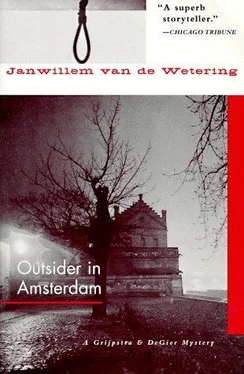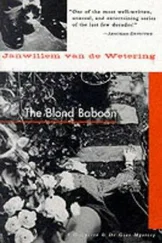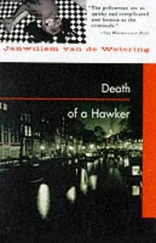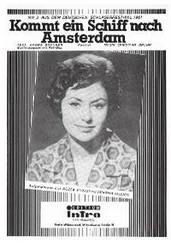Janwillem De Wetering - Outsider in Amsterdam
Здесь есть возможность читать онлайн «Janwillem De Wetering - Outsider in Amsterdam» весь текст электронной книги совершенно бесплатно (целиком полную версию без сокращений). В некоторых случаях можно слушать аудио, скачать через торрент в формате fb2 и присутствует краткое содержание. Жанр: Полицейский детектив, на английском языке. Описание произведения, (предисловие) а так же отзывы посетителей доступны на портале библиотеки ЛибКат.
- Название:Outsider in Amsterdam
- Автор:
- Жанр:
- Год:неизвестен
- ISBN:нет данных
- Рейтинг книги:4 / 5. Голосов: 1
-
Избранное:Добавить в избранное
- Отзывы:
-
Ваша оценка:
- 80
- 1
- 2
- 3
- 4
- 5
Outsider in Amsterdam: краткое содержание, описание и аннотация
Предлагаем к чтению аннотацию, описание, краткое содержание или предисловие (зависит от того, что написал сам автор книги «Outsider in Amsterdam»). Если вы не нашли необходимую информацию о книге — напишите в комментариях, мы постараемся отыскать её.
Outsider in Amsterdam — читать онлайн бесплатно полную книгу (весь текст) целиком
Ниже представлен текст книги, разбитый по страницам. Система сохранения места последней прочитанной страницы, позволяет с удобством читать онлайн бесплатно книгу «Outsider in Amsterdam», без необходимости каждый раз заново искать на чём Вы остановились. Поставьте закладку, и сможете в любой момент перейти на страницу, на которой закончили чтение.
Интервал:
Закладка:
De Gier thought about the crease in Piet's trousers, the combed hair, the beautiful mustache.
"What did you think of Piet's religion?" he asked. "This Hindism?"
"Bah," the girl said, "it made me puke. He talked such a lot of rot. Nothing really exists. Everything is illusion, everything changes and comes to an end. Life is a dream and nothing matters. It seems real but it isn't."
De Gier thought.
"But that could be true," he said.
"It is true," the girl said, "but you shouldn't hear P. et saying it. If one really knows that nothing is important and that we are only here to perform some sort of exercise (he used to say that as well), then one doesn't behave the way Piet behaved."
"And how did he behave?"
"In a silly way," Therese said. "Boring, depressive. He was very attached to property as well. He always said that property was just an idea and didn't matter and that we only have things so that we can use them and enjoy them, but that we should always be detached from them. But he was attached to every bit of furniture in the house, every book, every record. If you borrowed from him you would have to return it almost immediately. I never had a chance to finish a book. And he never gave anything away. He gave me things when he was trying to make me but I had to give it all back to him later. A little statue, a few shells, a record. I might as well give it back, he said, then we could share it. And he was always cleaning and polishing his car. And every day he calculated the exact worth of the Society. He was the Society. We were members but we weren't allowed to really touch it. Even when we went to the little house he bought in the south he checked the food we took with us and if he thought it was too much he would take it from the bag and put it back on the shelf. But when he went himself he took all he wanted."
De Gier shook his head.
"But if you disliked him so much, then why did you go to bed with him?"
Therese began to cry again.
"I don't know," she said. "Why did I? He kept on coming to my room and I don't make contact easily with people. When a man smiles at me I never know what to do. And men are always so difficult, they flirt and make silly jokes and Piet didn't. He said he wanted to go to bed with me and asked me to take my clothes off. The first few times I said 'No' but one evening I did."
Not bad, de Gier thought. He had heard about the method but had never met it in actual life. Perhaps I should try it on the girl in the bus, de Gier thought. I look her straight in the face and say "Miss, my name is Rinus de Gier. I want to go to bed with you. Here is my card. Could you come to my flat tonight? I'll be home from seven P.M. onward but don't come after eleven for then I am usually asleep."
"Are you listening to me?" Theiese asked.
"Sure, sure," de Gier said.
"Can I go then? Or do you still think that I hung Piet?"
"You can go," de Gier said. "If anything comes up I'll phone you. I have your address and your number."
"What could come up?" Theiese asked. "Piet is dead and I am pregnant and I must find a way to stop being pregnant."
Grijpstra had come in and de Gier told him what he had found out.
"Well, well," Grijpstra said, "throwing books, hey?"
Therese said nothing.
"Never mind," Grijpstra said. "Have a good trip to Rotterdam," and he gave the girl a kind look.
Together they searched the house again, room by room. They had plenty of time and worked slowly. They were disturbed by voices and went to investigate. The men from the city's health service had come to collect Mrs. Verboom. They were going to take her to a clinic for neuroses, near the coast.
Mrs. Verboom allowed herself to be taken away quietly. She didn't recognize the detectives. Van Meteren had given her another Palfium tablet and the old lady was only partly conscious and could hardly walk. Van Meteren carried her bag.
"How did you manage that so quickly?" de Gier asked when van Meteren returned.
"The physician helped. He wanted Mrs. Verboom to go to a clinic anyway and now that Piet isn't here to frustrate the idea it was very easy. She'll never be allowed to live in a normal house again. She is really mad, you know."
"In what way?" Grijpstra asked.
"Perhaps I shouldn't have said she is mad," van Meteren said sadly. "What is madness? She only thinks of herself, perhaps that is mad enough. And she can't look after herself. She is over eighty and needs opiates. An elderly drug addict. They won't cure her but perhaps they can keep her happy until she dies."
"You are right," Grijpstra said. "We live in a socialist country and suffering is prohibited by law."
"Suffering," van Meteren said disdainfully.
"You don't believe in it?" asked de Gier.
"No," van Meteren said. "Suffering is very egotistic."
"Nothing is important," said de Gier, who had learned a lot that day.
"Come off it," said Grijpstra, who had had enough. "This Eastern philosophy is all very well but we have work to do. We are dealing with a corpse, and with breaking and entering, and with theft. Maybe it isn't important but I would like to know who we have to arrest, just for the hell of it."
"That's all right," van Meteren said. "Work is all part of it. Do what you have to do, as long as you don't think it is important."
Grijpstra looked furious and van Meteren smiled and went up to his room.
A little later, in Piet's room, Grijpstra began to growl. De Gier recognized the sound, it reminded him of Oliver's growl when the cat was on the balcony and sensed the presence of the neighbor's Alsatian dog, separated from the cat by a thin glass plate. At such moments de Gier was frightened of his own cat, silly Oliver, suddenly transformed into a puffed up ball of rage, with a thick sweeping and twisting tail, spitting pure hatred.
"Yes, adjutant, what is it?" he asked sweetly.
"This," Grijpstra growled and pointed at a file that he had found on one of the bookshelves. "Look at this. Piet Verboom mortgaged his house, a couple of weeks ago, for fifty thousand guilders. That's a lot of money, a year's wage of a well-to-do man. The house looks all right but it is rackety and three hundred years old. Fifty thousand is about the most you can get on a mortgage, I am pretty sure. The money has been paid into his bank account and he has drawn it out again, together with another twenty-five thousand he had to his credit. It was taken out in cash. Where is it?"
"Any money left on the account?" de Gier asked.
"About ten thousand. This means that he has drawn about everything the Society owned in ready cash. And we found nothing. If it is here it must have been hidden in an impossible spot. If it is here. It's probably somewhere else by now."
"Stolen," de Gier said.
Grijpstra nodded.
"Then we have the motive."
"Certainly," Grijpstra said, and sat down.
"And the opportunity. Everybody had the chance to kill him. Van Meteren for instance. He must have killed quite a few people in New Guinea and he could have used the seventy-five thousand. And Mrs. Verboom, she is mad of course. But would she have wanted the money? She is over eighty years old."
"Money is money," de Gier said. "Old crazy people like to use it just like everyone else. Perhaps she has it in her bag and plans to spend it on a cruise around the world or a year in a luxury hotel in Madeira. There's an English hotel over there that caters to rich old ladies. Somebody told me about it."
"Possibly," said Grijpstra. "I wasn't trained along the new lines like you were. Psychology and all that. Perhaps you should go and visit her in the clinic."
"Nice," de Gier said. "Any more bright ideas?"
"A suspect has to be interrogated, even if she is as crazy as the government."
"True."
"And then we have Th6rese, she didn't like Piet either. She threw'dictionaries at him. And the boys, Eduard and Johan. Perhaps they got tired of being used and squeezed dry. Perhaps a joint venture of Eduard, Johan and Annetje. They worked for nothing for a long time and now, suddenly, rich! For seventy-five thousand you can buy a nice new houseboat and cover the floor with Persian carpets."
Читать дальшеИнтервал:
Закладка:
Похожие книги на «Outsider in Amsterdam»
Представляем Вашему вниманию похожие книги на «Outsider in Amsterdam» списком для выбора. Мы отобрали схожую по названию и смыслу литературу в надежде предоставить читателям больше вариантов отыскать новые, интересные, ещё непрочитанные произведения.
Обсуждение, отзывы о книге «Outsider in Amsterdam» и просто собственные мнения читателей. Оставьте ваши комментарии, напишите, что Вы думаете о произведении, его смысле или главных героях. Укажите что конкретно понравилось, а что нет, и почему Вы так считаете.












